Novelist Ellen Alpsten on why the real Russia is just as beguiling as she'd imagined
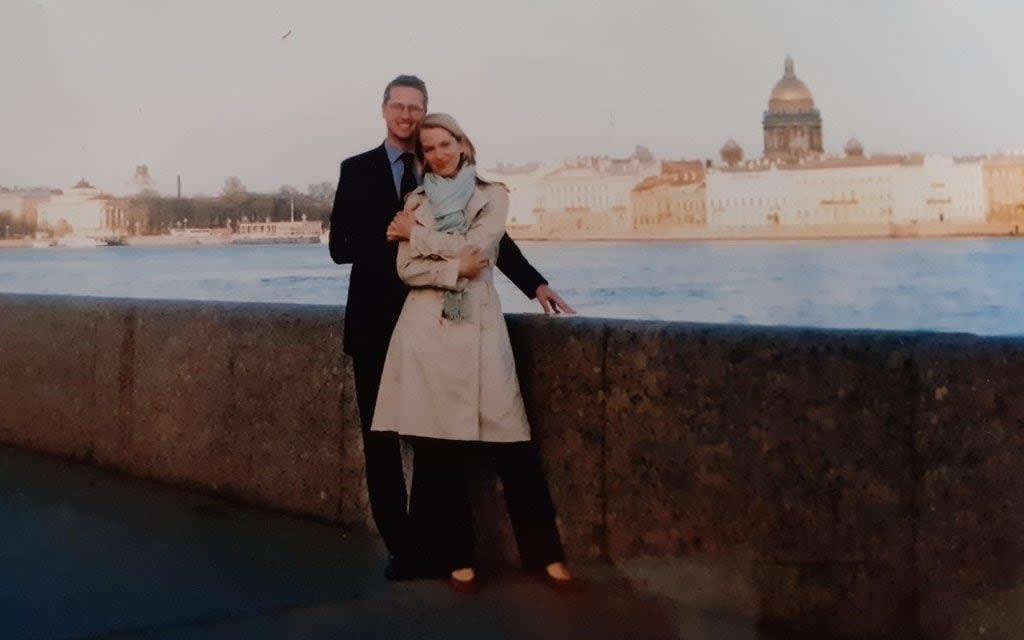
‘Why don’t I take you to St. Petersburg?’ my husband asked on Christmas Eve a couple of years ago, handing me a home-made voucher: clippings of the Winter Palace and Russian dolls.
I had finally finished writing my debut novel Tsarina – an epic, charting Catherine the I. of Russia’s rise from serf to Empress, as well as the country’s transformation from backward nation to super-power. Yet similar to the German writer Karl May, who wrote Winnetou about the Wild West while sitting in prison, I had never been to Russia.

My family’s relationship to the country is ambivalent: my father fled Communist East Germany through a night forest in 1956, aged 17; my cousin publishes books by latter-day Russian intellectuals.
I had discovered ‘my’ Catherine – who is not the Empress known as ‘the Great’, but rather the most powerful woman history ever forgot – when reading Germans and Russians by Leo Sievers, an account of their centuries-long shared history and mutual fascination. I did research for a year until I dared write the opening sentence, entering Catherine’s strange and sensuous world.
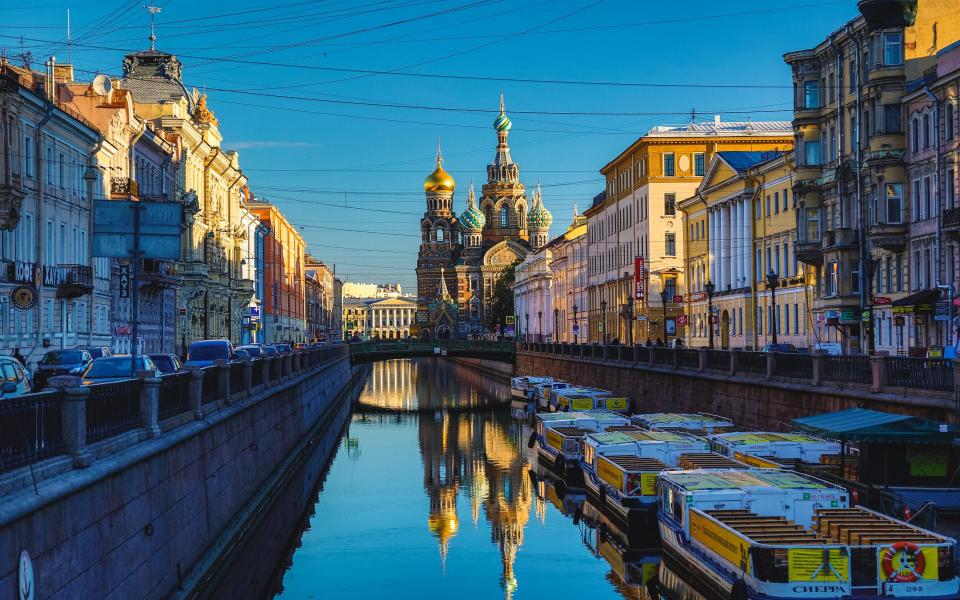
As during this lockdown, it felt then as though the historic framework offered my imagination more liberty than any exploration of modern St Petersburg would. And back then, too, the moment did not seem right for travel.
Three years into our marriage, we were busy making our career dreams come true. I worked as an anchor on financial breakfast TV, which meant gruesome night shifts coupled with a strict writing routine. My husband had left his career as a management consultant to start a healthcare IT company. Our financial future was hazy, but he had air miles left over, and my debut novel was with the publisher.
So, I took the voucher, feeling excited, yet afraid as well: would the reality live up to my imagination?
Leaving Pulkovo airport, people pushed us - after much laughter and moist kisses on both cheeks - off the public bus at Moskovskaya station. Our hostel lay at the crumbling end of the Nevsky Prospect.

For breakfast we hoped to find a bakery. But a simple bread roll was hard to find. Cafe shelves groaned under golden crisp biscuits, honey-dripping, layered Medovik tart and moist, spongy fruit cakes. We chose flavoured tchai from a simmering Samovar; others kicked off the day with ‘little water’ – vodka.
The traces of Peter the Great and Catherine’s stupendous love story awaited. April – just before the White Nights – was chilly, so I borrowed my husband’s clothes: his socks in my sandals, his sweater on top of my dress.
We walked up Nevsky Prospect, past the world’s oldest department store – Catherine, too, had shopped in the gostiny dvor. Willowy girls pushed me aside, assuming I was a frumpily dressed provincial guide taking a rich westerner round town.

The Hermitage – the Tsars’ former Winter Palace and today the world’s second largest art museum – looked very different when Peter the Great set his many foreign architects to work in 1711. ‘Only in St. Petersburg are ruins built to order,’ quipped Casanova, the legendary traveller and seducer of women.
The building’s teal and cream livery is breath-taking. ‘The morning breaks wan and cool; later, the palace’s bright, even façade reflects the day’s pale fire. You lured the light here, Peter, and gave it a home’, I wrote in Tsarina.
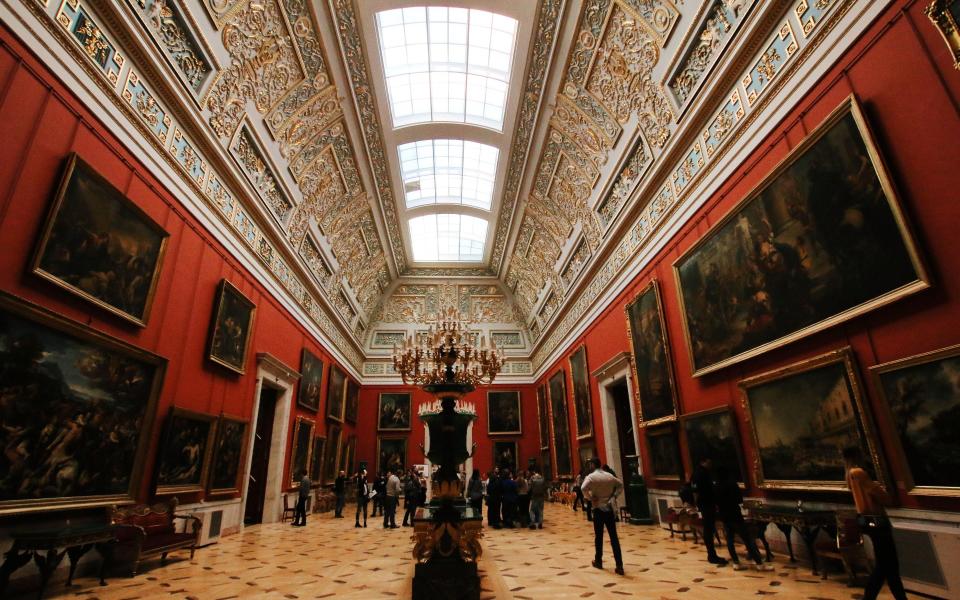
The museum which houses my heroine’s great niece, Catherine the Great’s, astonishing art collection is so stuffed with world-famous paintings that I overheard another visitor ask incredulously, ‘Surely, these are copies?’
The spring sunshine was grappling for strength; on the ice-green Neva river tour boats lay anchored as we crossed to Vasilevskiy island. Once the fiefdom of Prince Menshikov, a former pie-baker and Peter the Great’s best friend, it is the location for many a raucous feast in Tsarina.
Next door, the ‘Kunstkamera’ bears witness to Peter the Great’s fascination with nature’s misfits, displaying two-headed puppies and human fetuses with fishtails. The star-shaped SS Peter-and-Paul Bastion – a fortress built during the Great Northern War (1700-1721) to protect the young city against a Swedish onslaught – came into sight.
Here, one of my novel’s goriest scenes takes place: in its notorious Tsarist prison, Peter the Great’s rebellious eldest son, Alexei, awaited his fate, witless with fear. We stayed in a cell for some moments. The absolute darkness and silence were harrowing.
Russia is a land of contrasts and lunch in the bastion’s restaurant was as raucous as the prison was gloomy. Here we joined a Russian Army celebration and an all-female chamber ensemble played Rachmaninov.
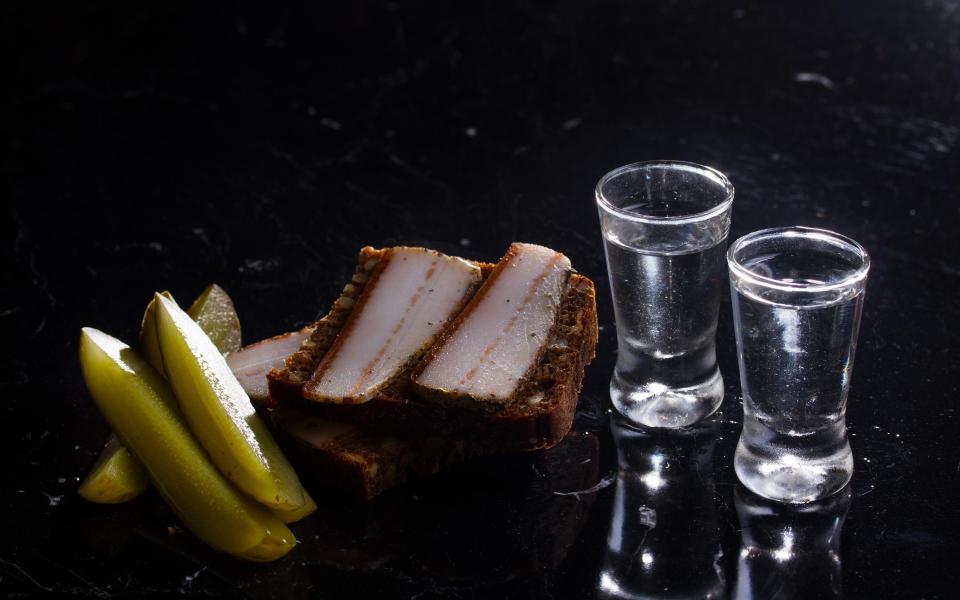
‘Little water’ flowed and drinkers smashed their stubby glasses against the thick walls of the restaurant, as we ate a main course of ‘Catherine’s thighs’ which turned out to be juicy duck legs stuffed with mushrooms.
‘Peter abhorred the cold and my embrace never lacked fire,’ my heroine says in Tsarina. At dusk, men gathered at the Bastion’s walls, braving the chill in swimming trunks. According to local custom you tan best while standing.

Not far from here, Peter the Great had a simple cabin built in three days in 1703. It was the city’s first house.
In some things, the absolute ruler of the world’s largest and wealthiest realm was a man of simple tastes. Eleven years later, he moved into a Summer Palace, a snug Baroque buttercup yellow structure on the opposite riverbank.
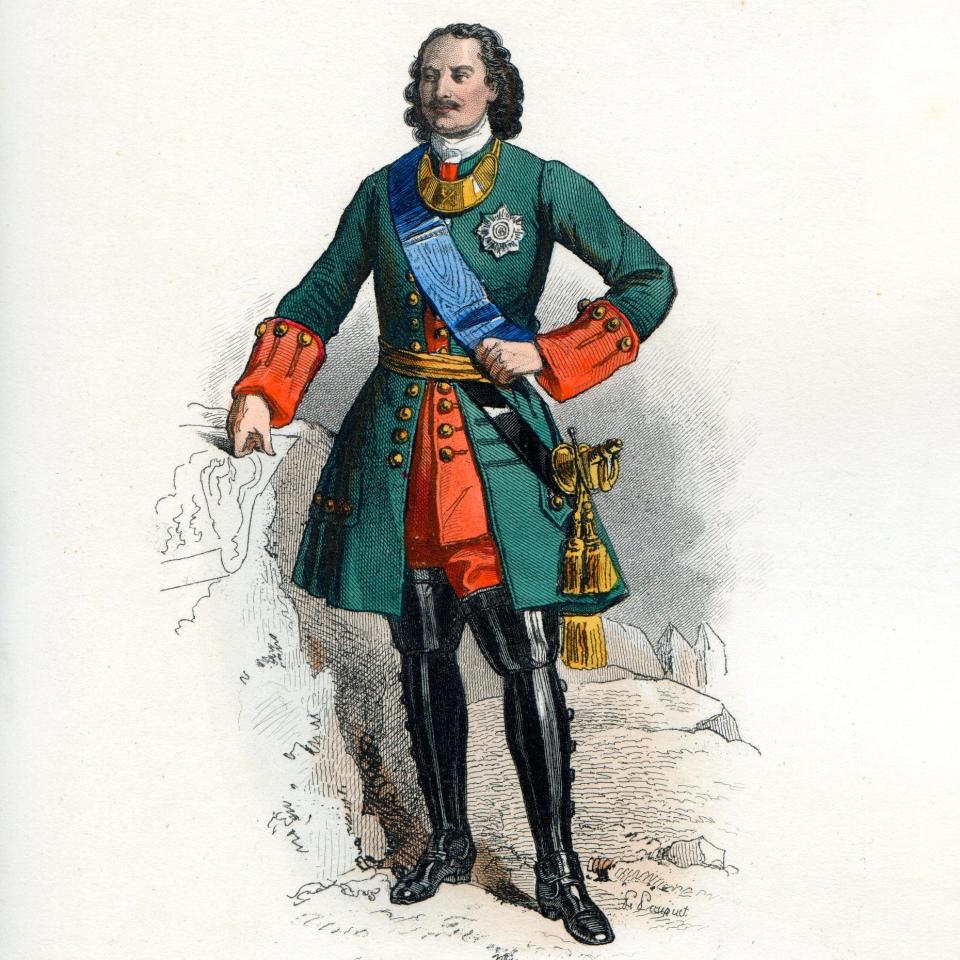
Catherine and Peter celebrated whenever possible – so how about an aperitif in the Grand Hotel ‘Europa’? No taxi, no problem: it is quite usual in Russia to flag down a passing car which will take you where you need to go for a couple of roubles.
The Skoda’s owner took us on a grand tour of the city and was so eager to show off his stereo’s mighty bass that we emerged from the car screaming spasiba – thank you - at the top of our lungs, bouncing along to the rhythm of his soundtrack.
‘Music, mobile phones, and machine guns forbidden,’ the hotel porter informed us; yet the Vodka Alexander (vodka, crème de cacao and cream strained over ice) was marvellous.
For supper we scouted out a pop-up restaurant in the vast courtyard of a derelict palace, slipping inside a sloppily chained door, chasing up marble staircases and playing ‘it’ along corridors and in empty state rooms before a dinner of salmon in pastry.

Catherine and Peter would travel to Peterhof, their summer hide-away on the Gulf of Finland, by barge; yet the road leading there was once one of Russia’s finest, before the wooden, pastel-coloured dachas were ripped down to serve as firewood in WW2, during the siege of Leningrad.
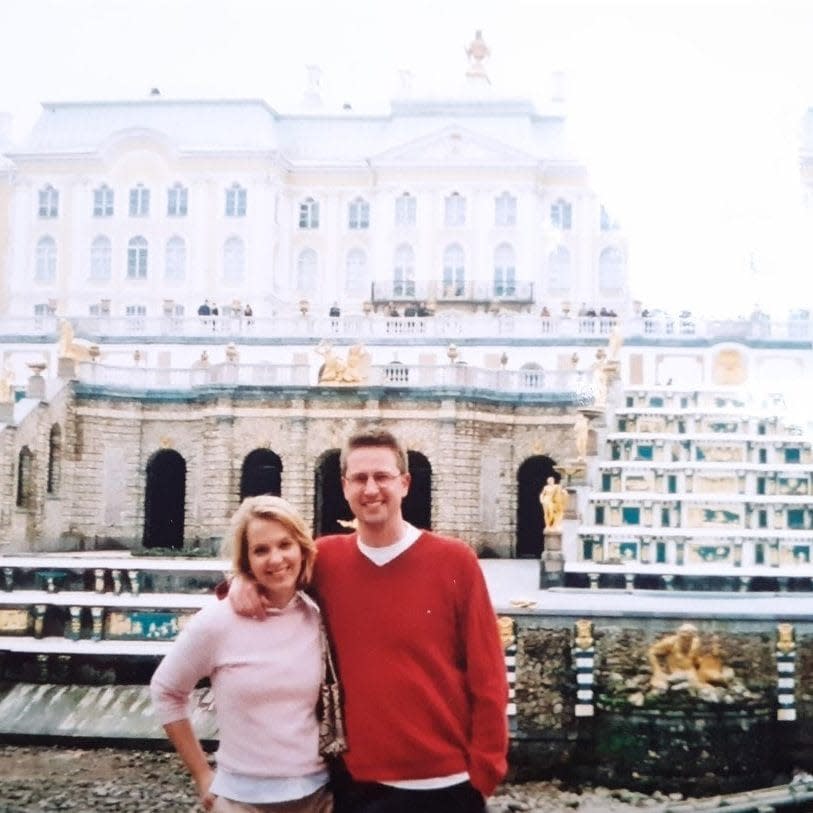
When we visited, the palace’s cascades and fountains were still dormant; instead, we had a last snowball fight with the bored guides and actors who were dressed as Russian grandees, waiting for tourists.
Peter the Great attempted several times in vain to launch theatres in his city: the audience was too rowdy to allow actors to perform.
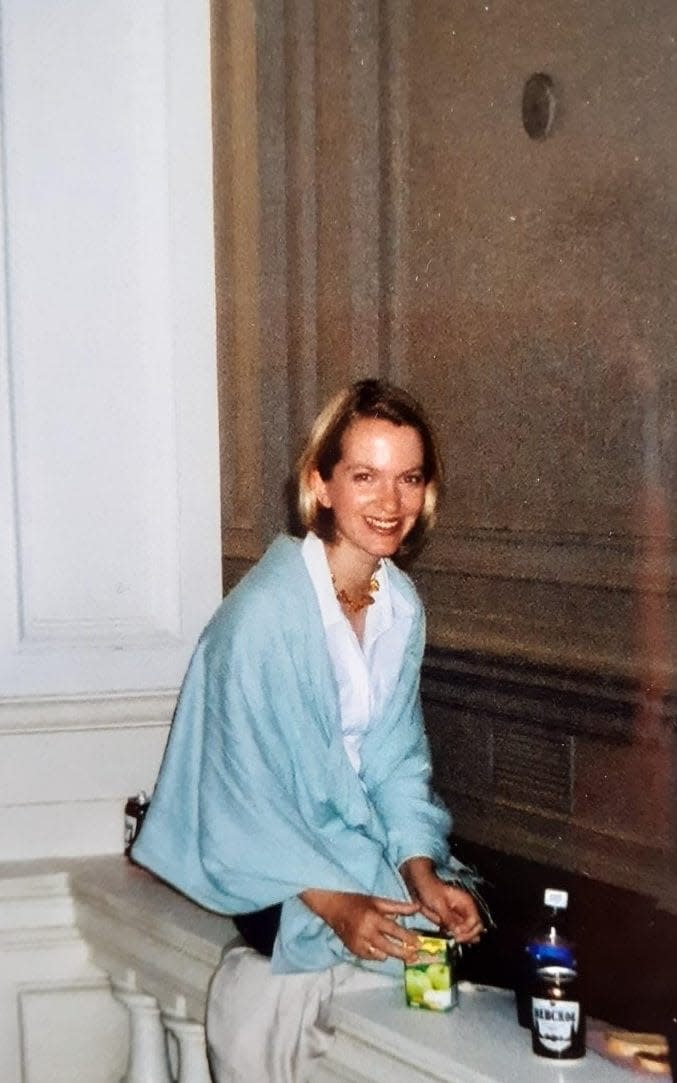
Times change: during the interval at the Mariinsky Theatre – we saw Martha Graham’s comic ballet Punch and the Judy – we feasted on caviar and blini and admired the sophisticated St. Petersburg audience.
Stepping outside, hearts and souls overflowing, I found my Tsarina’s words rang true once more: ‘St Petersburg evenings cast a spell like a net, in which we all are caught, reeling as helplessly as fish.’ St. Petersburg had been a city of the imagination for me while I was writing – yet I found the real thing just as beguiling.
Tsarina by Ellen Alpsten (Bloomsbury Publishing) is available in hardback and eBook from May 14
Sign up for the Telegraph Luxury newsletter for your weekly dose of exquisite taste and expert opinion.

